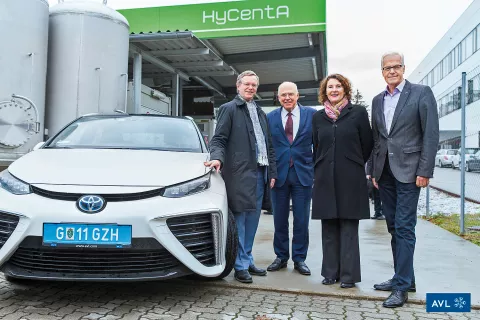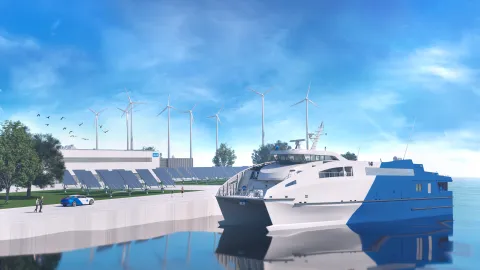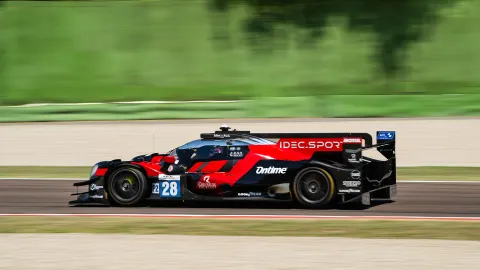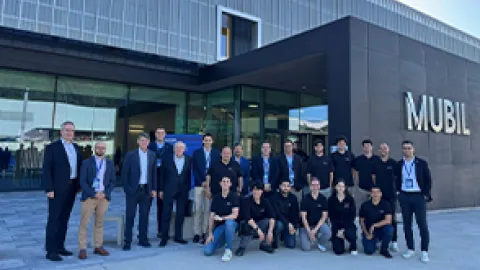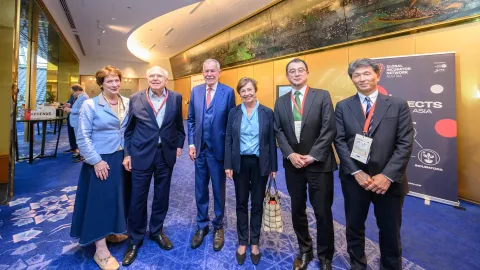TU Graz’s HyCentA and AVL List open Europe’s most modern test stand for fuel-cell systems
A building block in the energy revolution mosaic. The research centre HyCentA along with AVL List GmbH opened Europe’s most modern test infrastructure for fuel-cell systems on 21 October.
The direction is uncontroversial. If the EU wants to emit around 80 per cent less CO2 by 2050, there is no way of avoiding an energy revolution using green electricity from water, wind and sun and green hydrogen obtained from this electricity. Both energy carriers have to be comprehensive, safe and affordable – for vehicles, industrial processes and household applications. AVL CEO Helmut List: “As a leading global technology company developing test stands for fuel-cell systems, AVL together with HyCentA is making an essential contribution to the development of sustainable and environmentally friendly power trains.”
“We have a highly integrated research environment in which we can work on application-oriented issues of fuel-cell systems holistically and for different applications. This test stand will help us contribute to making fuel-cell systems fit for the nationwide use of hydrogen as an energy carrier,” emphasises Manfred Klell, scientific director of HyCentA. The target group for joint research projects are, on the one hand, automotive suppliers who are interested in integrating the parameters of a fuel-cell system available on the market into their vehicle types, and on the other hand, producers of fuel-cell systems who want to sound out the possible uses and application characteristics of their products.
High-dynamic test environment with a fully equipped virtual environment
This test infrastructure allows highly dynamic operating modes. Solutions for the development of motors in racing, such as for Formula 1, for example, allow for new dimensions of dynamics for trying out fuel-cell systems. In this outstanding test infrastructure, the load change is only limited by the fuel-cell system itself, which currently stands at 0.5 seconds. This means that experiments involving fuel-cell systems can be carried out under real load conditions and in dynamic operation. Researchers can trial concepts of energy management in fuel cells virtually and combine so-called “hardware in the loop” models on the test stand with real-time data of battery, e-motor or power train.
Starting efficiently at low temperatures
Fuel-cell systems also need to be optimised with regard to cold starting, since this represents a big challenge for material and operating strategies in automotive applications. Using the new test infrastructure, researchers can pay special attention to thermal management and the safe and efficient operation of fuel-cell systems at low temperatures. Another core focus is optimised heat removal and the design of the cooling system. There is even a focus on the potential for the use of waste heat.
Targeted premature ageing – accelerated ageing testing
Another application area of the new test stand is ageing in the service of science. To find out how long fuel-cell systems work under normal operating conditions, they have to age in fast motion. This is achieved by means of targeted loads outside the specifications but inside the design limits. Using special measuring technology, the main influencers on the duration of fuel-call systems can be experimentally identified and conclusions drawn.
Test stand is a Research Studio Austria
The costs of the whole research project amount to 2.3 million euros. Most of this comprises funds from the Research Studios AUSTRIA programme of the Austrian Research Promotion Agency (FFG) and the Federal Ministry of Science, Research and Economy (bmwfw). The Research Studios Austria (RSA) programme supports the application and implementation of research results from basic research in the forefront of corporate research in Austria.
AVL is active worldwide both in the field of development and manufacture of test stands for fuel-cell systems and the development of stationary plants and propulsion systems using fuel cells.
This research topic is anchored in the Field of Expertise “Mobility & production”, one of the five research foci. Besides TU Graz (50%) , Forschungsgesellschaft für Verbrennungskraftmaschinen und Thermodynamik m.b.H. (25%), Magna (12.5%) and OMV (12.5%) have shareholdings in HyCentA.
Contact
HyCentA
Manfred KLELL
Assoc.Prof. Dipl.-Ing. Dr.techn.
Scientific director of HyCentA Research GmbH
Institute of Internal Combustion Engines and Thermodynamics, TU Graz.
Mobile: 0043 699 814 401 49
Email: klell@hycenta.at
With more than 12,200 employees, AVL is one of the world's leading mobility technology companies for development, simulation and testing in the automotive industry and in other sectors such as rail, shipping and energy. Based on extensive in-house research activities, AVL delivers concepts, technology solutions, methodologies and development tools for a greener, safer and better world of mobility and beyond.
AVL supports international partners and customers in sustainable and digital transformation. The focus here is on the areas of electrification, software, AI and automation. AVL also supports companies in energy-intensive sectors on their way to green and efficient energy generation and supply.
AVL's passion is innovation. Together with an international network of experts spanning 90 locations with more than 50 competence and development centers worldwide, AVL is driving the future of mobility. In 2024, the company generated a turnover of 2.03 billion euros, of which 11% was invested in R&D activities.
For more information: www.avl.com
Stay up-to-date as a journalist with our latest press releases concerning company updates, research projects, our latest developments, and more.
Download our fact sheet to get a comprehensive overview about what we do as well as our latest company figures.
